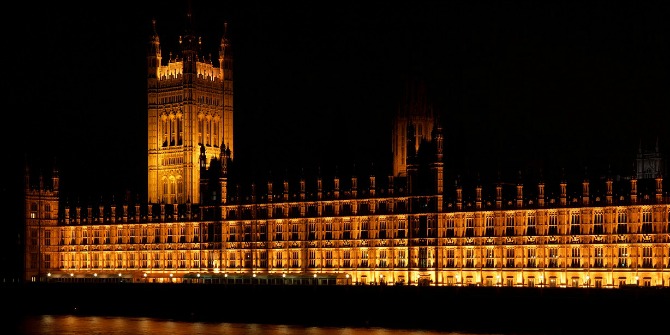 Since 1999, Scottish devolution has been operating with a unicameral Parliament. James Mitchell argues that recent rancorous controversies have raised questions about whether further institutional evolution is needed. He discusses three ways through which this can be achieved – entrenching powers in a written Scottish constitution, moving to a bicameral Parliament, and remodelling central-local relations.
Since 1999, Scottish devolution has been operating with a unicameral Parliament. James Mitchell argues that recent rancorous controversies have raised questions about whether further institutional evolution is needed. He discusses three ways through which this can be achieved – entrenching powers in a written Scottish constitution, moving to a bicameral Parliament, and remodelling central-local relations.
It is difficult to reconcile devolution today with the early expectations and hopes invested in the new Scottish Parliament. In some respects, Scottish devolution has become the caricature of Westminster that it sought to shun. Scotland has a power-hoarding executive that disdains alternative sources of authority, whether that is Parliament itself or elected local councils.
As I have written elsewhere, the multiple recent controversies around the Salmond-Sturgeon affair have also demonstrated in an acute way that Scottish politics is now angry and hyper-partisan, operating in a toxic political environment. This does not augur well for the future, whether independence is achieved or is not. Any discussion of Scotland’s future under either outcome now needs to include some serious attention around how we can improve our political culture, better share power, and increase democratic accountability. Three ways forward seem worth following up.
Entrenching Scotland’s powers
One of the challenges that the Constitutional Convention confronted way back before devolution in 1989 was how to entrench any devolution settlement. This issue has returned with force with the Brexit ‘power grab’ on devolved competences by Westminster and Whitehall. We must, by now, realise that we cannot rely on a Scottish version of Peter Hennessy’s ‘good chaps’ model of tacit understandings, but instead acknowledge Sidney Low’s comment that ‘we live under a system of tacit understandings. But the understandings themselves are not always understood’.
An obvious step would be to create an entrenched written constitution. That is not on the cards for Scotland at present, though it may yet emerge in the UK as a whole, which would make a Scottish version also conceivable. Is the alternative to create institutions more willing and able to provide the checks and balances that the current Scottish Parliament has failed to deliver? Reforming our committees, extending parliamentary privilege to MSPs, and improved resourcing of Holyrood are no doubt needed. But none of that will necessarily improve the checks and balances nationally if one-party dominance persists, nor will they alter relations between central and local government.
A second chamber at Holyrood?
The idea of moving to a bicameral Scottish Parliament is worth consideration, and it has been mooted and dismissed over the years. As Presiding Officer, David Steel raised the possibility, but he was mocked for suggesting something that critics chose to interpret as a second House of Lords. Cheryl Saunders, an Australian constitutionalist and one of the world’s leading scholars in this field, warned that the rationale for bicameralism was difficult to establish ‘beyond a general belief in the value of a second opportunity for deliberation, whatever the party composition of the second chamber’.
Second chambers in state or regional legislatures below the national level are not the norm, but they continue to exist at this level in five states in Australia (not Queensland) and across almost all the United States – just not in Nebraska. Bicameralism is the norm in these federal states – with one chamber providing representation to the components of the state. Elsewhere though bicameralism is less common. Though operating at federal level, the German Bundesrat offers an interesting model of a chamber which has veto powers in some areas of policy and can offer opinions in others. It has proved an effective voice for the German Länder.
The usual nature of bicameralism should not prevent its consideration in Scotland so long as we take full account of Saunders’s observation. We need more than a general belief in its value. We require a clear purpose which will have an impact on its composition. One approach would be to create a small second chamber (perhaps of 30 members) that is nationally elected on strictly proportional lines, using a different voting system from the lower house so as to create a (likely) check on the power of the government party or coalition in the lower house – as happens with the Australian Senate. Alternatively, perhaps a number of regional constituencies might be used with more equalised numbers of seats to boost regional representation. Its competencies would need to be carefully set out, and it might not need to meet as frequently or regularly as existing MSPs. A very bold reform might even adopt sortition, selecting a kind of ‘Citizen’s Assembly’ chamber by lot.
A different and obvious purpose would be to use a second chamber as a means of providing local authorities with an authoritative voice at the centre, the opportunity to put the brakes on further centralisation and ensure that the local impact and implementation of policies are taken into account. An increasing number of constitutions recognise the autonomy of local government. The German Grundgesetz (Basic Law) was the first to recognise local self-government in a formal constitution. A localist logic to a new second chamber would give it a clear purpose. Under this logic, the second chamber again need not be large. It might even be indirectly elected, consisting of elected councillors chosen by their colleagues.
Central-local relations in Scotland
Holyrood needs to revive its original commitment to power-sharing with communities, and to subsidiarity. At its inception, the Scottish Parliament could legitimately claim to be bold and innovative. It can be again. Devolved government has moved a long way from the renewed positive relationship between Scottish central and local government envisaged. The report of the Commission chaired by Neil McIntosh, one of Scotland’s most distinguished public servants, set out principles and proposals for ‘moving forward’ after years of turbulence and damage to relations between the old Scottish Office and local authorities. For many decades, long before devolution, a process of centralisation had seen local government stripped of autonomy and resources. Devolution was supposed to change the relationship but the process continued and has accelerated in recent years.
A ‘Covenant’, a joint agreement setting out the basis of a working agreement between local and central government, was amongst the McIntosh proposals. A ‘ready and appropriate source of material’ was available, the Commission noted, in the European Charter of Local Self-Government (from the Council of Europe) and included the Charter’s main terms in an appendix. Over two decades later, Andy Wightman’s bill incorporating the Charter into law offers a welcome change in central-local relations. Wightman has proved to be one of the most independent minded Members of the Scottish Parliament since its creation and one who has engaged seriously with policy concerns.
But in welcoming this measure, we need to put the European Charter into perspective. Its incorporation is an important step, not least symbolically. But enacted alone, it will not alter the relationship significantly. What it does is revive the ideas of subsidiarity, mutual respect, and parity of esteem which were the cornerstones of the anticipated new relationship. Much more is required, but this is an important first step.
As we proceed, we can either assume that the Charter’s philosophy will become embedded and that declaratory statements of intent are enough. We simply cannot expect that incorporating the Charter into law will suffice. We need institutional reform to provide a check on over-weening government and provide balance to the constitution.
Conclusions
When reforms long sought are finally achieved, there is a tendency to shut down discussion about ideas for further change, to consolidate on what has been achieved. Yet it is important to recognise a need for next-generation reforms and evolution also. For as James Madison robustly noted centuries ago, in Federalist Paper 51:
It may be a reflection on human nature, that such devices [checks and balances] should be necessary to control the abuses of government. But what is government itself, but the greatest of all reflections on human nature? If men [and women] were angels, no government would be necessary. If angels were to govern men [and women], neither external nor internal controls on government would be necessary. In framing a government which is to be administered by men [and women] over men [and women], the great difficulty lies in this: you must first enable the government to control the governed; and in the next place oblige it to control itself. A dependence on the people is, no doubt, the primary control on the government; but experience has taught mankind the necessity of auxiliary precautions.
Perhaps 2021’s raging upsets represent Scotland’s loss of innocence about the nature of our domestic politics. Now we need to do something about it.
_____________________
This is a revised version of an article that originally appeared in the Sceptical Scot.
 James Mitchell (@ProfJMitchell) is Chair in Public Policy at the University of Edinburgh.
James Mitchell (@ProfJMitchell) is Chair in Public Policy at the University of Edinburgh.
Photo by Dominik Rešek on Unsplash.







